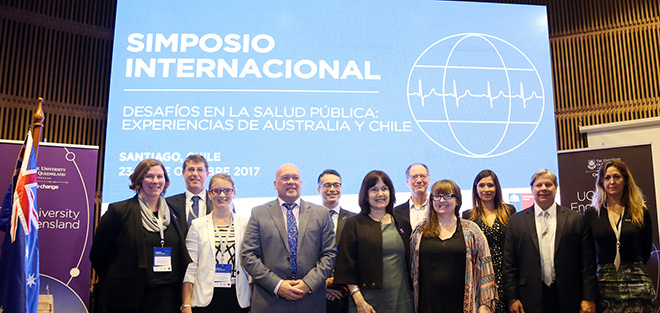Aging, cancer and obesity were some of the topics discussed at the International Symposium organized by the Ministry of Health, The University of Queensland (UQ) and the UC Vice- Presidency for Research Affairs.

To exchange knowledge and good practices on some of the main challenges for public and global health of the 21st century, the international symposium “Challenges in public health: experiences from Australia and Chile” was held, where academics from the prestigious University of Queensland in Australia, along with Chilean experts, shared experiences and addressed important challenges in an area that is of greatest concern to Chileans.
The activity was headed by the Deputy Secretary of Public Health, Jaime Burrows; the Pontificia Universidad Católica Vice-President for Research Affairs, Pedro Bouchon; the University of Queensland Vice Chancellor, Iain Watson; and the Ambassador of Australia, Robert Fergusson. One of the main objectives of the meeting, said Burrows, is to contribute to the strengthening of bilateral cooperation between Australia and Chile, facilitating dialogue between governments, the academic community and both countries in general.
As a university, said UC Vice-President for Research Affairs, it is important to participate in the debate on issues that are transcendental for Chile, such as health. “The problems that will be dealt with in this symposium are complex and require analysis from an interdisciplinary perspective. It is also important to general international alliances that allow us to learn from the experience that other countries have had. Finally, it is also very important to promote joint work between academia and the government, in order to contribute to future public policies”.
The University of Queensland Vice Chancellor, Iain Watson, spoke how researchers can make big changes that come to improve people’s quality of life. “This alliance between both countries can be very fruitful and can help us fight various diseases that afflict both nations, and promote better health for the population. We hope to get the most out of the Chilean experience and we hope to generate more opportunities for joint work ”.
The topics analyzed were:
- Obesity: With a high prevalence in the populations of Australia and Chile, it represents a relevant risk factor in the development of non-transmittable diseases, such as cardiovascular diseases, diabetes and cancer, among others. Obesity in Australia reached 28% in 2014-2015, and in Chile 25% in 2010, which poses challenges not only for the health system, but also for the countries’ areas of social and economic protection.
- Cancer: It is one of the diseases that has advanced the most globally in terms of health, economic and social impact. In Chile, cancer represents more than 26% of deaths per year (more than 25 thousand people die each year from cancers), being the second cause of death in the country. In Australia, more than 29% of its population dies of cancer and represents the second leading cause of death in the country.
- Healthy Aging: The demographic transition is being experienced progressively in countries that have advanced in standards of living and well-being for their population. In Chile, life expectancy at birth is 80 years for men and 85 for women. In Australia, meanwhile, it reaches 82.5 years. Both countries have to adapt to the aging population process, which presents challenges for both the health system and the social protection systems.
- Health and Indigenous Peoples: Both Australia and Chile have a significant Indigenous population. In Australia, 2.8% of the population belongs to an Aboriginal people or Torres Strait Island. In Chile, 9.1% of the population declares that they belong to one of the 9 indigenous peoples recognized in the country. Thus, the health system and policies must consider this diversity to adapt to different cultures and take care of the health of the entire population.